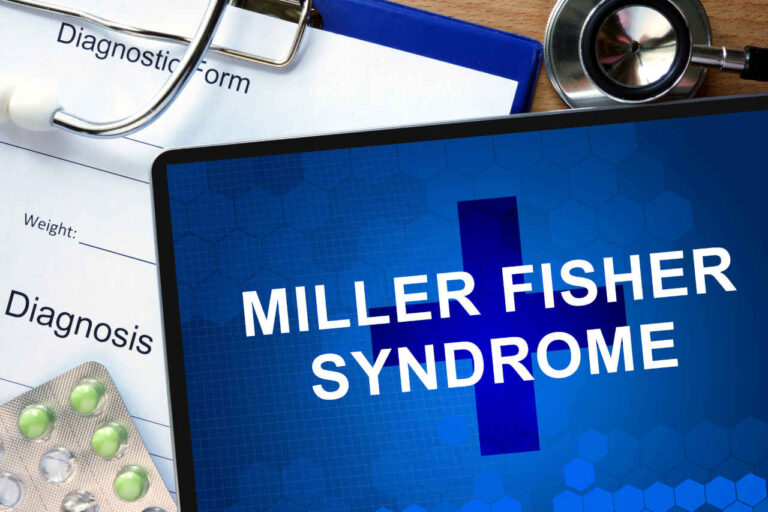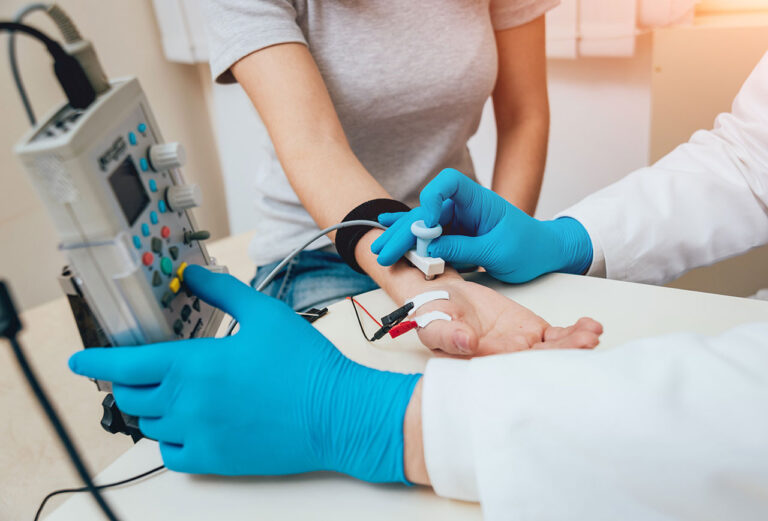
Understanding the causes of Guillain-Barre syndrome is essential for recognizing symptoms and seeking timely treatment. This rare neurological disorder can have significant implications for those affected.
In this guide, we’ll explore what causes GBS and discuss the risk factors that may increase susceptibility to it. We’ll also look at the different types of GBS, their symptoms, triggers, and more to help you better understand this condition.
What Is Guillain-Barre Syndrome (GBS)?
Guillain-Barre syndrome can also be referred to as “acute inflammatory demyelinating polyneuropathy” and “Landry’s ascending paralysis.”
While the exact causes of Guillain-Barre syndrome are still under investigation, we know that this rare neurological inflammatory disorder affects the peripheral nerves located outside the brain and spinal cord.
As a result, this can lead to a rapid onset of symptoms, including:
- Loss of reflexes
- Severe pain and discomfort
- Impaired breathing functions
- Difficulty walking or climbing stairs
- Weakness that can spread from the legs to the upper body
- Tingling or prickling sensations (paresthesia) in the legs or arms
- Difficulty with facial movements, including speaking and chewing
The term “paralysis” means the complete or partial loss of body muscle function. [1] Understanding the causes and symptoms of Guillain-Barre syndrome is the first step toward its timely diagnosis and management.
Risk Factors for GBS
What causes GBS doesn’t seem to be related to sex. GBS can affect any patient population; both males and females are equally at risk, and GBS can occur at any age onset.
However, it seems to be more prevalent in adults and older individuals. It is estimated to affect roughly 1 in 100,000 people per year.
Several risk factors may contribute to the underlying causes of GBS. One factor is age, as older adults are more susceptible to developing GBS. Additionally, individuals with certain infections may have a higher likelihood of experiencing an autoimmune reaction.
Recent vaccinations or surgeries, although rare, can act as triggering causes of Guillain-Barre syndrome. Understanding these risk factors can help individuals recognize the potential for developing this syndrome.
Get IVIG Copay Assistance
Speak to a SpecialistWhat Are The Different Types Of Guillain-Barre Syndrome?

There are several variants of GBS, and rapid onset is a characteristic shared by all of them:
- Acute inflammatory demyelinating polyneuropathy (AIDP): This “classic” variant accounts for 75% – 80% of cases.
- Acute motor axonal neuropathy (AMAN): This variant is similar to AIDP but does not exhibit sensory symptoms.
- Acute motor sensory axonal neuropathy (AMSAN): This severe variant of GBS is more prevalent in China, Japan, and Mexico.
- Miller Fisher syndrome: Characterized by double vision, loss of balance, and deep tendon reflexes [1].
Causes of Guillain-Barre Syndrome
What exactly causes GBS is still not well established. However, most cases commonly occur within a few days or weeks following a respiratory or gastrointestinal viral infection. Studies have shown that such infections can trigger an autoimmune response.
Typically, the immune system produces antibodies and uses special white blood cells to defend against infectious microorganisms, such as bacteria and viruses. However, in Guillain-Barré syndrome (GBS), the immune system mistakenly attacks healthy nerves.
The term “autoimmune” is used because the patient’s immune system of antibodies and white blood cells attack the body, causing damage to the myelin (nerve cell covering or insulation), which can lead to numbness and weakness [1].
Infections and certain medical conditions can often serve as precursors to autoimmune responses and cause the onset of Guillain-Barre syndrome. The following are the most common triggering causes of GBS.
Bacterial Triggers
Campylobacter jejuni
Campylobacter jejuni is a common bacterial pathogen that causes gastrointestinal infections, primarily leading to diarrhea. This bacterium is often contracted through the consumption of undercooked or contaminated poultry. It’s one of the most frequently identified infectious triggers of Guillain-Barre syndrome.
What causes GBS following this infection? Studies show that infections with this bacterium can trigger autoimmune responses. Approximately 30-40% of GBS cases are related to this bacterial infection.
Haemophilus influenzae
Haemophilus influenzae is one of the other bacterial causes of Guillain-Barre syndrome. This bacterium can cause respiratory infections, particularly in children and those with weakened immune systems. It may then trigger an abnormal immune response, leading to GBS.
Haemophilus influenzae is less commonly associated with the disease than campylobacter. However, it still presents a risk for some individuals. Understanding this connection helps in monitoring those who have previously contracted such infections.
Viral Triggers
Cytomegalovirus
Cytomegalovirus (CMV) is a type of herpes virus that can lead to chest infections or glandular fever. It can remain dormant in the body and reactivate under stress or illness.
CMV is one of the potential triggering causes of Guillain-Barre syndrome in 0.6 – 2.2 per 1000 cases. It can provoke a strong immune response, particularly in immunocompromised individuals, and contribute to disease development.
Epstein-Barr Virus
Another viral cause of GBS is the Epstein-Barr virus (EBV). This virus is known for causing infectious mononucleosis. It’s prevalent in the general population, and while most people recover without complications, a small subset may develop GBS following infection.
What causes GBS following an EBV infection is the immune system’s attempt to eliminate the virus, but inadvertently damaging the myelin sheath of nerves.
Hepatitis E
One of the other viral causes of Guillain-Barre syndrome is Hepatitis E (HEV). HEV is primarily contracted through contaminated water and can lead to liver inflammation and jaundice.
Emerging evidence shows that infections with this virus may sometimes trigger Guillain-Barre syndrome. While HEV is relatively rare in developed countries, its association with GBS warrants attention, especially in endemic areas.
Zika Virus
Zika virus, primarily spread through mosquito bites, causes mild symptoms such as fever, rash, and joint pain. However, it has been associated with neurological complications, including GBS.
Individuals who contract Zika may exhibit an abnormal immune response that leads to an attack on the peripheral nervous system. This association was noted during the Zika outbreaks, with reports of increased cases of GBS.
SARS-CoV-2
The last viral cause of Guillain-Barre syndrome is SARS-CoV-2 (also known as COVID-19), which is the cause of the COVID-19 pandemic.
Studies show a higher chance of getting GBS (about 145 extra cases for every 10 million people who tested positive for SARS-CoV-2) in the 1 to 28 days after a positive COVID-19 test.
However, research is ongoing to determine what exactly causes GBS after COVID-19 infection and whether this correlation is coincidental.
Other Triggers
Surgery and Vaccination
Other causes of GBS, while rare, include recent surgical procedures and vaccinations [3]. Disease development in these instances may stem from the body’s immune response to new antigens introduced during surgery or vaccination.
While the exact cause of Guillain-Barre syndrome in these cases remains unclear, monitoring post-surgical or post-vaccination symptoms is essential, particularly in individuals at higher risk for GBS.
Consult an IVIG Specialist
The Best IVIG Home InfusionPrognosis and Life Expectancy of Guillain-Barre Syndrome

Guillain-Barre syndrome generally has a positive prognosis and life expectancy, especially with early intervention and appropriate treatment.
Research indicates that approximately 70% of individuals with GBS will fully recover within one to two years. The survival rate is notably high, but some may experience lingering effects or complications, particularly if they have severe initial symptoms.
The mortality rate is between 3% to 13%, often due to complications such as respiratory failure. Factors influencing recovery include age, the severity of symptoms at onset, certain existing health conditions, and the underlying cause of Guillain-Barre syndrome.
With ongoing management and support, most patients can lead fulfilling lives post-diagnosis.
Receive At-Home GBS Treatment From AmeriPharma® Specialty Pharmacy
We still don’t know what exactly causes GBS at this time. The causes of GBS can be related to the immune system responses following an infection. Prior illnesses may also play a vital role in disease development.
However, we know managing GBS is possible with timely diagnosis and treatment. AmeriPharma® Specialty Pharmacy can help you receive this treatment in the comfort of your home.
Our ACHC-accredited specialty pharmacy provides at-home IVIG infusions to individuals in 40+ US states and territories. Contact us today to speak to a patient navigator and receive specialty care with full-service coordination, copay assistance, and 24/7/365 support.
Don’t forget to visit our blog to learn more about the causes of Guillain-Barre syndrome and the various treatments available for this condition.













